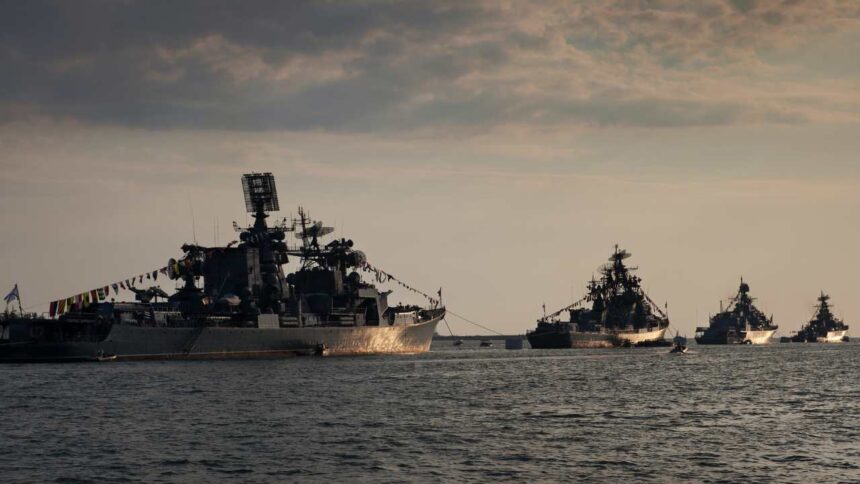(SQAUK) — In a concerning development reminiscent of the darkest days of the Cold War, a fleet of Russian warships has set a course for the Caribbean, raising the specter of a potential new Cuban Missile Crisis. This move comes as tensions over the conflict in Ukraine have escalated to unprecedented levels, prompting fears of a wider global confrontation.
The Russian Ministry of Defense has confirmed that a flotilla, including the formidable Slava-class cruiser Moskva and several destroyers, has departed from its base in Severomorsk and is heading toward the Western Hemisphere. This move is seen as a direct response to NATO’s increased military presence in Eastern Europe and the recent supply of advanced weaponry to Ukrainian forces.
Military analysts suggest that deploying these warships will send a clear message to Washington: Russia will not be cornered or intimidated. The presence of these vessels in the Caribbean, in proximity to the United States, is a stark reminder of the strategic tensions that once defined the Cold War era.
International reactions have been swift and varied. The United States has condemned the move as a “dangerous escalation,” with Secretary of State Antony Blinken urging Moscow to de-escalate the situation immediately. “We will not be bullied or threatened,” Blinken stated in a press briefing. “Our commitment to the sovereignty and territorial integrity of Ukraine is unwavering.”
Meanwhile, NATO Secretary General Jens Stoltenberg announced that the alliance is closely monitoring the situation. “We are prepared to defend our members and partners from any form of aggression,” Stoltenberg asserted. Enhanced air and naval patrols have been initiated in the Atlantic, signaling a readiness to respond to potential threats.
The current developments eerily mirror the Cuban Missile Crisis of 1962, when the world teetered on the brink of nuclear war as the Soviet Union attempted to deploy ballistic missiles in Cuba, just 90 miles from U.S. shores. The crisis was defused through intense diplomatic negotiations, leading to the removal of Soviet missiles from Cuba and U.S. missiles from Turkey.
Today’s geopolitical landscape, however, presents new complexities. The conflict in Ukraine has drawn in a web of alliances and rivalries, with economic sanctions and cyber warfare adding layers of tension. The potential for miscalculations and unintended escalations is high, making the current standoff particularly perilous.
Several factors could lead to a significant crisis. Any perceived violation of territorial waters by the Russian flotilla could prompt a military response from the U.S. Similarly, an incident involving reconnaissance aircraft or naval patrols in the disputed region could escalate out of control.
Economic warfare is also a powerful weapon in this conflict. Sanctions on Russian energy exports could escalate, leading to retaliatory cyber attacks on critical infrastructure in Western nations. The interconnected nature of modern economies means such actions would have far-reaching consequences, affecting global markets and everyday lives.
Despite the severe situation, diplomatic solutions are still being considered. Recent communications behind the scenes indicate that Washington and Moscow seek ways to avoid direct military conflict. Proposed actions include setting up new communication channels, renewing arms control agreements, and organizing high-level meetings to discuss strategies for reducing tensions.
The international community is also getting involved, with China and several European nations offering to mediate talks between Russia and the U.S. These efforts aim to establish a framework for resolving the conflict in Ukraine and lowering global tensions.
The world is anxiously watching as Russian warships head toward the Caribbean. The possibility of a new Cuban Missile Crisis is becoming increasingly likely, highlighting the fragility of global peace. While diplomatic efforts are ongoing, the situation remains precarious, a stark reminder of how quickly geopolitical dynamics can shift from tension to confrontation.
In this unpredictable environment, the actions of leaders on all sides will be crucial in determining whether the world can avoid a new Cold War. The upcoming days and weeks will play a vital role in shaping the fate of international relations and maintaining the delicate balance of global peace.



